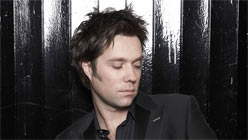Hovering somewhere between pop star and cult figure, and wanting to be both, is Rufus Wainwright. Scion of one of North American pop music’s royal families, would-be diva, budding Puccini, and the man Elton John (only somewhat tongue-in-cheek) called “the greatest songwriter on the planet,” Rufus Wainwright joins guest conductor Michael Francis and the San Francisco Symphony for the world premiere of his Five Shakespeare Sonnets Thursday through Saturday, November 11-13 at Davies Symphony Hall. It’s a concert that has been several years in the making, and which at one point seemed to be under some kind of curse, with one postponement, and replacements of both personnel and repertoire. But the final configuration — and it may actually happen! — is a fascinating look at what can happen when the worlds of classical and popular music converge.
Rufus Wainwright is one of the most original voices in popular music, one of the few songwriters who can bring a “classical” sensibility to his work without making it sound pretentious or precious. This is not his first venture into “art music” territory, either. His first opera, Prima Donna has had several successful productions in the UK and Canada (although the Met turned it down), and his most recent album, All Days are Nights: Songs for Lulu, is written as a song cycle, and full of big, lush, almost orchestral piano playing. In the great tradition of Franz Schubert, Stephen Foster, and George Gershwin, Wainwright’s pop songs are art songs. They tell stories, they capture moods, and, most importantly (at least, to the tradition), the music supports the words, and vice versa. This may be one reason why San Francisco was one of the first cities to embrace him and his music. Now, he’s returning the favor by responding to the San Francisco Symphony’s commission with his Five Shakespeare Sonnets, a work that he originally wrote for a theater piece by maverick writer/director/producer Robert Wilson. Wainwright says, “One cannot immerse themselves in Shakespeare’s sonnets and not be submerged, drowned, and finally resurrected a better human being. They are, hands down, the greatest works ever written.” The five sonnets (43, 20, 10, 129, 87 — look them up and be supremely moved) could be seen as charting the progression of a love affair — but does it end happily or unhappily? The ambiguity is classic Wainwright.
I mentioned that this concert seemed cursed, and for a while it did. Wainwright’s piece was originally scheduled for a concert last April, but it wasn’t finished in time — possibly because Wainwright was orchestrating it himself, something that most pop stars who try to write in “classical” style can’t do. The replacement work — Duncan Sheik singing songs from his theater piece Whisper House — was less-than-enthusiastically received. Wainwright’s piece was rescheduled for this season, but just two weeks ago it was announced that guest conductor and pianist Jeffrey Kahane had withdrawn due to illness. Kahane received his training here at the San Francisco Conservatory of Music, spent 11 years as Music Director of the Santa Rosa Symphony, and had made something of a specialty of the piece he was supposed to play, Ravel’s jazzy Piano Concerto in G. Kahane’s illness meant that not only would there be a new conductor but a new piece on the program. Fortunately, both replacements should give the program that much more spice; conductor Michael Francis will be making his San Francisco Symphony debut, and the piece he brings with him not only fits the theme but has a local connection as well.

Guest Conductor, Michael Francis
The new piece on the program, Darius Milhaud’s ballet La Création du Monde, was written in 1923, just as jazz was beginning to take over the concert and dance halls of Paris. The third work is a crossover curiosity: Symphony No. 2 by Kurt Weill, the man who wrote The Threepenny Opera and so many theater pieces with Berthold Brecht. Weill wrote his symphony in 1934, as the clouds of fascism were beginning to cover Europe, and the whole work is colored by the personal and political turmoil in his life. It was his last work of “absolute” concert music, as if he realized that it was his calling to write music that spoke to the people in their own, popular language. Interesting facts: Wainwright’s Five Shakespeare Sonnets had their original premiere in 2009 in a production by the Berliner Ensemble, the company founded in 1949 by Berthold Brecht. Milhaud taught music at Mills College in Oakland from 1947 to 1971.


